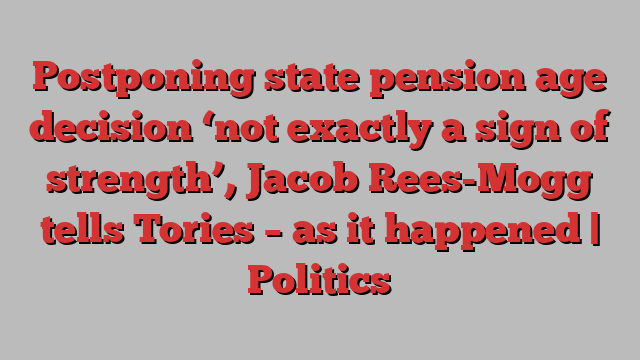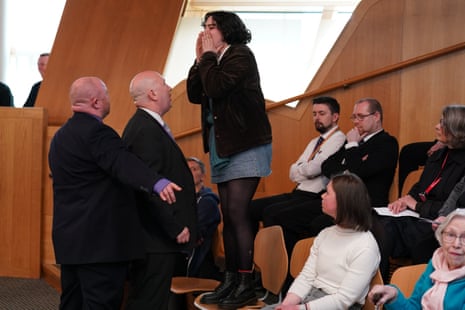
Postponing state pension age decision ‘not exactly sign of strength’, says Rees-Mogg
Jacob Rees-Mogg, the former business secretary, has said that the government’s announcement about postponing the decision about accelerating the rise in the state pension age to 68 is “not exactly a sign of strength”.
Speaking in the Commons, he told Mel Stride, the work and pensions secretary:
Unlike the Labour party I don’t welcome this decision. That life expectancy from retirement from the 1940s to today has increased by seven years, which would indicate a retirement age of 72 rather than of 67 or 68.
The benefit of long-term decision-making is that it gives everybody the chance to plan well in advance. And the delaying the decision is a decision in itself, and is not exactly a sign of strength.
In response, Stride said the government wanted to wait “until we are more certain about what the future holds”.
Key events
Afternoon summary

Archbishop of Canterbury calls for radical overhaul of social care system, saying current model ‘cannot be tweaked’
In January the Church of England published a report from a Commission on Reimagining Care set up by the archbishops of Canterbury and York. It proposed a national care covenant as a means of implementing “a vision of one-another care, where we have a better sense of what we should do for each other in communities and neighbourhoods, find agreement about where different responsibilities lie, and build long-term networks and associations that will allow people to flourish”.
In a debate on the report in the House of Lords, Justin Welby, the archbishop of Canterbury, said the current social care system was broken and “cannot be tweaked”.
He went on:
Every part of society is needed to be involved in care.
We need an understanding that care and support is not an end itself, but the means by which every person can begin to fulfil their potential as it varies through life as human beings.
He also said cost should not be the starting point.
Funding matters. If it is our starting point, we will fail.
Once we know what kind of care system we are aiming for then we can begin see how it could progressively be paid for.
Much as I admire the Treasury, if we start with them we are pragmatic, but we are unlikely to be imaginative.
The revolutionary value which would be at the heart of our social care system is interdependence.
Interdependence takes us away from a narrow argument about who should provide care and instead says that responsibility lies with all of us to different degrees.
In the light of our coverage of the climate protest in Edinburgh, a reader BTL points out that Greenpeace activists staged a protest yesterday outside Rishi Sunak’s home in Yorkshire where the local electricty network had to be upgraded to ensure he can heat his swimming pool. (Sunak paid, reportedly.)
Protests at FMQs will continue until Scottish government halts new oil and gas projects, say climate activists
This is Rigged, the Scottish climate activist group, has put out a statement about the disruption of first minister’s questions today at Holyrood. It says this is the eighth week in a row that FMQs has been disrupted, as part of a campaign that it is running with other groups, including Just Stop Oil. And it says the protests will continue until the Scottish government stops all new oil and gas projects, and commits to a “fully funded fair transition” to green energy.
The statement includes quotes from three of the activists who took part in today’s protest.
Jen (32), a climate scientist from Uddingston, said:
I’m sick and tired of knowing the truth (climate reality – I had to leave my career, as a climate scientist, because the truth of climate breakdown is terrifying) and seeing it buried or ignored. The Scottish climate movement is here and we will not accept anything less than a just transition.
Max, who is retired and from Midlothian, said:
We now call on Humza Yousaf to reset Scotland on the right path, a path in which Scotland will lead the world in ultra-rapid decarbonisation, providing a truly just and equitable transition for its fossil fuel workers and the Global South in mitigating the worst of a crisis that we developed nations have bequeathed our global community. A clear public statement rejecting any new oil and gas development, including, most importantly, Rosebank, is an essential first step.
And Emma English (23), a student from Glasgow, said:
I am disrupting FMQs because the Scottish government must step up and commit to a green future. We are running out of time and so far the Scottish government has not done nearly enough to fight climate change.

The International Longevity Centre, a thinktank focusing on longevity, has criticised the government’s announcement about putting off until after the next election the decision about whether to speed up increasing the state pension age to 68.
David Sinclair, the ILC’s chief executive, said:
A delay to the increase in state pension age may be politically expedient but in the long term it is inevitable that we will be getting our pension later than previous generations. So, a failure to make the tough decision now will give any future government difficult financial choices about increasing taxation or reducing spending.
The state pension costs the government over £100bn a year and has increased threefold since 2000. By 2040 there will be more than 17 million people aged 65+, 4 million more than today and so these costs will rise even further. The Institute for Fiscal Studies has suggested that delaying the increase by seven years is likely to cost over £60bn. This could pay for a lot of levelling up, a lot of preventative health and a lot of care.
But Independent Age, a charity that supports the elderly, welcomed the decision. John Palmer, its director of policy and communications, said:
Many people can breathe a sigh of relief for now as there won’t be an imminent speeding up of plans to increase the pension age to 68. We know that previous changes to the state pension age resulted in increased poverty among people left behind. Bringing forward the rise to 68 would have meant more people struggling financially in their mid 60s and beyond.
In the Commons the Tory MP Sir John Redwood asked Mel Stride, the work and pensions secretary, how much the government would save by raising the state pension age to 68. Stride did not give an answer in the chamber, but he said he would write to Redwood with a reply.
Stride might have been better placed to give an answer if he had read last week’s Institute for Fiscal Studies briefing on this topic. “A reasonable estimate is that increasing the state pension age by one year in the late 2030s would save the government £8-£9bn a year in today’s terms,” the IFS said.
Postponing state pension age decision ‘not exactly sign of strength’, says Rees-Mogg
Jacob Rees-Mogg, the former business secretary, has said that the government’s announcement about postponing the decision about accelerating the rise in the state pension age to 68 is “not exactly a sign of strength”.
Speaking in the Commons, he told Mel Stride, the work and pensions secretary:
Unlike the Labour party I don’t welcome this decision. That life expectancy from retirement from the 1940s to today has increased by seven years, which would indicate a retirement age of 72 rather than of 67 or 68.
The benefit of long-term decision-making is that it gives everybody the chance to plan well in advance. And the delaying the decision is a decision in itself, and is not exactly a sign of strength.
In response, Stride said the government wanted to wait “until we are more certain about what the future holds”.
Teachers call for clear guidance on how to support trans pupils in England
Teaching leaders have called on ministers to provide guidance on how to support students who identify as transgender, saying they are “caught in the crossfire” between strongly held views, Alexandra Topping reports. This came after Policy Exchange, a conservative thinktank, published a report saying safeguarding principles were being “routinely disregarded in many secondary schools” when it came to gender identity, with some parents not told when their child first questioned their identity.
Alexandra’s full story is here.
Humza Yousaf says he looks forward to byelection in Margaret Ferrier’s seat where he claims SNP support ‘strong’

Severin Carrell
Humza Yousaf, the newly elected SNP leader and first minister, said he believed there should be a byelection in Ferrier’s seat, and said he disagreed with the decision by the SNP MP on the standards committee to vote against her 30-day suspension. (See 9.35am and 12.01pm.)
Yousaf told reporters at Holyrood he was not aware Allan Dorans, the SNP MP for Ayr, Carrick and Cumnock, had backed a Tory move to set Ferrier’s suspension at nine days – a day below the 10-day threshold for a recall petition. That decision by Dorans may have preceded Yousaf’s election as SNP leader on Monday.
Yousaf said:
I think [Dorans] should’ve backed the suspension, which has been agreed by the committee. But I think the important thing is for the Margaret Ferrier to finally do the right thing and stand down.
We’ve said from day one that Margaret Ferrier should’ve stepped down because of her reckless actions, [and] I look forward to fighting that byelection on our strong track record.
We take nothing for granted and won’t be complacent [about the SNP’s prospects of holding the seat]. We have strong support, we know, in Rutherglen and right across that region but it will take hard work, but I think it’s the right thing for Margaret Ferrier to do, to stand down.

Hunt says UK will not be going ‘toe-to-toe’ with US in ‘global subsidy race’ on renewable energy
In a speech on Tuesday Ed Miliband, the shadow secretary for climate change and net zero, gave a speech saying that Labour wanted to match the ambition of President Biden’s Inflation Reduction Act – his plan for a $369bn investment in renewable energy and cutting emissions, involving huge subsidies. Miliband argued that this was “a modern green industrial policy at work” and that the UK was falling behind in the race for green energy.
In a column in the Times today Jeremy Hunt, the chancellor, responds to some of the arguments used by Miliband. He argues that it is the US that is catching up, not the UK.
While no one doubts that the US government’s Inflation Reduction Act (IRA) is a significant intervention, it is not the starting pistol in the race for green tech. That race started decades ago in the UK, with the world now playing catch-up.
Just under 40 per cent of our power was generated from renewable sources last year, double that of the US.
We have invested more in green growth per year in the past two years than planned annual US IRA spending over the next ten years, relative to the size of our respective economies.
Hunt also says the government does not want to follow Biden’s subsidy-heavy approach.
Today we are going further with our “Powering Up Britain” plan, the first part in our response to the challenges created by the US IRA ahead of an even fuller national response at the autumn statement.
However, our approach will be different — and better. We are not going toe-to-toe with our friends and allies in some distortive global subsidy race.
With the threat of protectionism creeping its way back into the world economy, the long-term solution is not subsidy but security.

Labour says state pension age decision ‘damning’ admission life expectancy stalling under government policies
Labour has welcomed the decision to postpone a decision about bringing forward the rise in the state pension age to 68. But Jonathan Ashworth, the shadow work and pensions secretary, said this was an admission that under government policy life expectancy is stalling.
He told MPs:
Today’s announcement that they are not going ahead with accelerating the state pension age is welcome, and it is the right one.
But it is the clearest admission yet that a rising tide of poverty is dragging life expectancy down for so many, and stalling life expectancy, going backwards in some of the poorest communities, is a damning indictment of 13 years of failure which the minister should have acknowledged and apologised for today.
Here are pictures of some of the climate activists who disrupted first minister’s questions at Holyrood.




‘Half-baked, half-hearted’: critics deride UK’s long-awaited climate strategy
The UK’s new energy plan unveiled today is a missed opportunity full of “half-baked, half-hearted” policies that do not go far enough to power Britain’s climate goals, according to green business groups and academics. Jillian Ambrose has the story here.
The National says the protesters who disrupted FMQs in Edinburgh today (see 12.16pm) were all from This is Rigged, a Scottish climate activist group opposed to new oil and gas developments in the North Sea. It has written about them here.
This Is Rigged confirmed to The National that they were responsible for all five suspensions at today’s FMQs
Here’s who they are and what you need to know about themhttps://t.co/aYfhwFpugs
— The National (@ScotNational) March 30, 2023